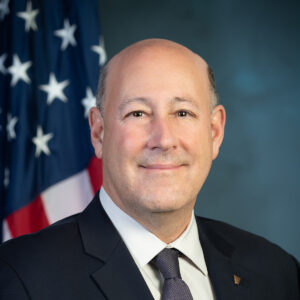Counselors certified by the U.S. Department of Housing and Urban Development (HUD) to offer guidance to borrowers of the Home Equity Conversion Mortgage (HECM) program are the best there is at what they do, but there is always room for improvement.
HUD’s Office of Housing Counseling is making plans to improve the HECM counseling experience, including by bolstering the ranks of its HUD-certified HECM counselors.
This is according to David Berenbaum, deputy assistant secretary for the Office of Housing Counseling at HUD, during a presentation at the National Reverse Mortgage Lenders Association (NRMLA) Annual Meeting and Expo in Nashville last month.
How HECM counselors assist reverse mortgage borrowers
Reverse mortgage counselors have the unique ability to provide assistance to reverse mortgage borrowers at a critical phase on the road to origination, Berenbaum said.
Berenbaum hears feedback in the HECM space about the Homeowners Assistance Fund (HAF), designed to provide financial assistance to any mortgage borrower financially impacted by the COVID-19 coronavirus pandemic.
“During the pandemic, […] we helped over 300,000 families apply for the Treasury programs, the emergency rental assistance program, as well as the Homeowners Assistance Fund,” he said. “It made a big difference. We heard about the role it played [concerning homeowners’ association (HOA)] fees for example, for consumers who had the reverse mortgage product. Our counselors do a lot of very important work, and our office monitors their compliance with our program and ensures the quality of the program overall.”
HECM counselors play a critical role in helping reverse mortgage borrowers age in place, and to do it “wisely” by understanding the financial resources required, he said.
A need to ‘elevate the profession’
HUD-certified HECM counselors — and the department’s housing counselors broadly — do not always receive recognition for their professional proficiency, Berenbaum said.
“[G]oal number one is to elevate the profession — and I do mean the profession — of housing counselors,” he explained. “Too often, housing counseling agencies are treated as charitable organizations and their staff are not viewed as skilled professionals. Well, certification of housing counselors has changed that game.”

Berenbaum suggested it is more difficult to pass the certification exam required for housing counselors than licensing exams in other areas, which is certainly true of the counselors providing HUD-certified HECM counseling, he said.
“The 250 HUD-certified counselors in the reverse mortgage space, they are best in their class because they continue to take continuing education, [and] to take that exam to ensure the good work that they are doing,” Berenbaum said. “It is truly about ‘people in places,’” he said, attributing that phrase to HUD Secretary Marcia Fudge.
Berenbaum is not satisfied, he said. While the Office of Housing Counseling serves an estimated 1.2 million prospective mortgage borrowers every year, the goal of the office is to increase that to 3 million households a year moving forward, and one way to accomplish that is through a change to the fee structure.
“Every dollar of HUD funding leverages between $7 and $10 of private sector funding from other programs out there in the world, and that includes work being done by agencies in fee-for-service because their time is valuable as professionals and it’s very appropriate for professionals to charge a reasonable fee, even in not-for-profit environments.”
The Housing Counseling Program can support low-to-moderate-income consumers who may not be able to afford a professional fee, Berenbaum said. But moving toward the goal of 3 million households served by counseling annually requires changes, especially if that means bolstering the rank of reverse mortgage counselors.
Adding to the ranks of reverse mortgage counselors
The goal to hit 3 million households served every year would include “substantial growth in the reverse mortgage space,” Berenbaum said.
“Respectfully many consumers who are benefiting from the reverse mortgage program can afford a reasonable fee for service moving forward,” he explained.
Berenbaum also said that the expectation in his office is that as the American population ages, reverse mortgage volume will rise, requiring additional collaboration between his office and members of the reverse mortgage industry.
“First, we want to increase our collaboration with NRMLA, and all of you as industry professionals,” he said. “This is a priority for us. As Americans are aging, we know that in fact, there will be an increase in the number of reverse mortgages originated, and we’ll see an increase in the reverse mortgage for purchase side of the equation as well. There’s a critical role of housing counseling there.”
Providing additional training support for new counselors is also essential, as is streamlining and simplifying the program is a priority that comes both from President Biden and Secretary Fudge, he said.
“Right now you have to go to two different areas to take HUD’s examination to become a certified examiner, a certified counselor, or to be a HECM certified counselor,” he explained. “We’re going to bring those both into one portal to simplify that entire process and streamline the materials for prospective counselors.”
Bolstering the availability of HUD HECM counselors is also a priority, he said.
“Right now there are approximately 250 [HUD-cetified HECM] counselors, and I hope within the next two years we can see that number substantially increase,” he said. “A lot will depend on market conditions. To be a HUD-certified housing counselor, you must be employed by a HUD-approved housing counseling organization, so they need to have the resources in fact to hire those individuals.”





